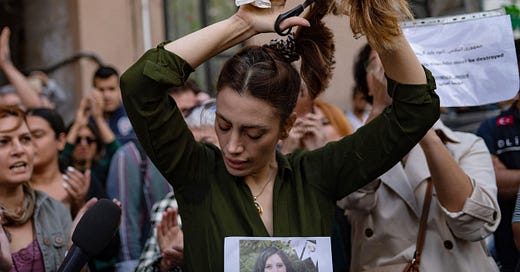Our failure to act on Iran's violent misogyny is a sacrilege
The brave women of Tehran need support not platitudes, writes George Pitcher
Mahsa Amini, a 22-year-old Kurdish student, set off a little over a month ago for a sightseeing and shopping trip to Tehran. Emerging from a station, she was approached by the morality police, who arrested her for being improperly veiled and showing some hair. Some hours later she was admitted, beaten and bruised, to hospital, where she died.
This week, an Iranian sports climber called Elnaz Rekabi, 33, went missing for a day at the Asian championships in Seoul and has been flown back to Tehran “in disgrace” for competing without her headscarf. She arrived to a hero’s welcome from supporters and offered an apologetic statement, which may have been made under duress. Her whereabouts are now unknown.
Hell-hole
If she’s incarcerated in Evin prison, a hell-hole for Iranian dissidents, one prays she doesn’t suffer a mysterious fall, knocks her head and dies of “natural causes”, as was claimed for Amini by the authorities. It may be that the unprecedented women’s protests in Iran, in the wake of the latter’s death, spares her that fate.
With breathtaking courage, women and girls of Iran, of all ethnicities, have taken to the streets and rallied behind the slogan “Women, Life, Freedom”, launching an apparently fearless challenge to Iran’s theocracy. A video shared on social media last week (since withdrawn to avoid identification) showed schoolgirls in Tehran giggling as they stamped on a framed photo of Khomeini and his successor Ayatollah Ali Khamenei.
Defiance
Middle-fingers are brandished at the supreme leaders, headscarves are publicly burned and women have been cutting their hair off in defiance of the patriarchy. As one seasoned, female reporter in the UK puts it: “It makes you weep with pride.” Rana Rahimpour, The BBC World Service’s Iran specialist, posts a clip of three little girls, no more than 10 years old, joyously waving their hijabs, their thick manes swinging freely.
Weep with pride we may, but the West should also cringe with shame. Where is the firm affirmation of these extraordinary women’s rights to freedom? Where is the pledge to stand with them against oppression? US President Joe Biden has threatened “further costs” against those responsible for violence against peaceful protestors. France has pushed for the EU to “target senior officials and hold them responsible.” The UK government has summoned the Iranian ambassador and foreign secretary James Cleverly has described levels of violence against the women as “truly shocking”.
Escalating sanctions
That’s pathetic. If western governments offered Iranian women one-tenth of the support that they offered the people of Ukraine, they would be escalating already imposed sanctions against Iran and arming the dissidents. But existing sanctions are only about Iran supplying drones to Russia for its invasion of Ukraine.
And where’s the western Church? If the archbishops and/or pope have launched a joint statement of condemnation against Iran’s violent misogyny, I must have missed it.
It’s almost as if the Church has form on paternalism and oppression of women. Perish the thought. It surely can’t be that church leaders are still struck by the apostle Paul’s injunction to the Corinthians that “the head of the woman is man” and that “every woman who prays or prophesies with her head uncovered dishonours her head—it is the same as having her head shaved.”
For clarity, Paul continues: “For if a woman does not cover her head, she might as well have her hair cut off; but if it is a disgrace for a woman to have her hair cut off or her head shaved, then she should cover her head.”
Societal lens
Paul was a man of his time. But we are people of our own time too. We are entitled to see what is happening in Iran through our own moral and societal lens, just as Paul was entitled to view his society through his.
We might add that the greater example is set to us from the gospel, with the apostleship of Mary Magdalene, the liberation of the Samaritan woman at the well, the healing of the bleeding woman and the levelling-up of the Syro-Phoenician woman who begs “crumbs from the table” – to name but a few.
To ignore the women of Iran is to be complicit in the oppression not just of them, but of those gospel women. And that must be a sacrilege.
Standing and waiting
A defence, of sorts, for western nations, which seek to serve by only standing and waiting, is to take refuge in geo-politics. There are still western hostages to protect in Iran. And, indeed, it’s important that these demonstrations are not an attack on Islam, as Kamin Mohammadi wrote in the Guardian, but a call to end the abuses of a state that has taken Muslim symbols and used them as a weapon to suppress half the population. But the Ayatollahs have never shrunk from conflating their politics and religion – and nor should we in the face of cruelty and oppression.
Ultimately, it’s about where we believe power resides. In the ancient world, hair had mystical power. In the Hebrew bible’s story of Samson, his lover Delilah saps his power by cutting his hair. In the new testament, Paul believed that women shamed themselves by cutting their hair.
But today, Iran’s women have found their power by doing so. We might witness to that inversion of power as resonant with our gospel, affirm it and act accordingly.
George Pitcher is a visiting fellow at the LSE and an Anglican priest
A version of this column appeared on PremierChristianity




